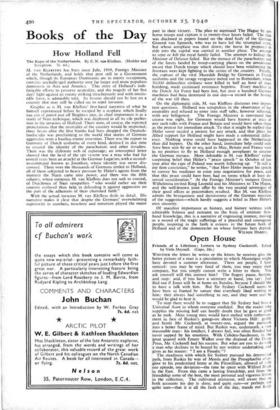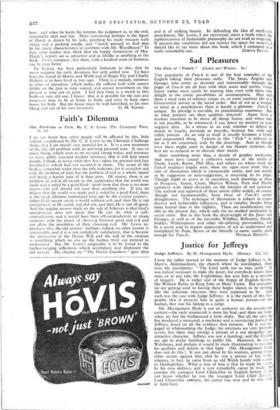Open House
Friends of a Lifetime : Letters to Sydney Cockerell. Edited
• by Viola Meynell. (Cape, 18s.)
WHETHER the letters he writes or the letters he receives give the hater picture of a man is a speculation to which Montaigne might have devoted a summer afternoon. There are people, I have noticed: you may be very fond of them, you may enjoy their company, but you simply cannot write a letter to them. You nsk yourself will this interest him? The fingers pause, hesitate, and stop: and, if you have a secretary at hand, you say: Just ;find out if Jones will be at home on Sunday, bec4use I should like :to have a talk with him. But Sir Sydney Cockerell seems to have been so framed by nature that everybody liked writing to !him: they always had something to say, and they were sure he would be glad to hear it.
To stop there would be to suggest that Sir Sydney had been a Universal Aunt in whom everyone confided. But the reader who supplies the missing half can hardly doubt that he gave as good as he took. Most young men would have melted with embarrass:- iment in face of Ruskin's goings-on about' Victoria Hill: gentlY and firmly Mr. Cockerel, at twenty-one, argued the patriarch into a better frame of mind. But Ruskin was, underneath, a very :reasonable man : his intellect, I always feel, was often flooded but ;never sapped by his emotions. • With Cobden-Sanderson, in the 'great quarrel with Emery Walker over the disposal of the Doves 'Press, Mr. Cockerel' had his success. But what are you to do with a man who declines to be bound by any written undertaking, and gives as his reason: "I am a Fanatic "? . The steadiness with which Sir Sydney pursued his determined ,Path, from Ruskin by way of Morris tacl the Preraphaelite after- glow to his predestined home at the Fitzwilliam, allowed of only one episode, one deviation—the time he spent with Wilfred Blunt in the East. From this came a lasting friendship, and from the ;friendship some of the best, the most personal and vigorous letters in the collection. The cultivated aristocrat, well aware that on iboth. accounts his day is done, and quite sure—orhap= ps not quite Sure—that it is all the fault of. the day, stands out finely here: and when he keeps his temper, his judgment is, to the end, remarkably alert and fair. More convincing perhaps is the figure of Hardy as drawn by his wife, patching his study trousers with string and a packing needle, and "much amused to find that: he has many characteristics in common with Mr. Woodhouse." In fact, some readers may think that the happy domesticity of Mrs. Hardy's reports are as attractive and as lifelike as anything in the book. Two's company :1 but three, with a kindred sense of humour,. can be even better - Sir Sydney has been particularly fortunate in this, that he; never outgrew his early devotions but only added new. To have been the friend of Morris and Webb and of Roger Fry and Charlie. Ricketts is to have lived in two ages. There is a malady, common: in times of transition, which makes the sufferer look with uneasy. dislike on the past as time wasted, and uneasy resentment on the: present as time out of joint. I feel that there is a moral in this, book—a very old one, I know: that it is possible for the just and tenacioas man to be at home in both, and even to keep open. house for both. But the house must be well furnished, to his own
liking and out of his own resources. G. M. YOUNG.



























 Previous page
Previous page